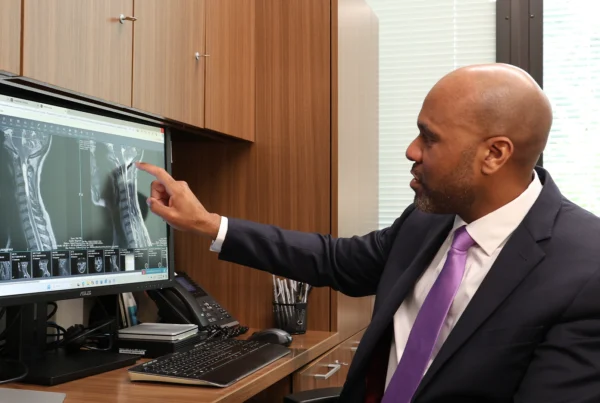Surgery and recovery can be intimidating words if you are preparing for microvascular decompression surgery. Many people assume that any surgery related to the neck or spine will have them laid up for weeks, if not months.
Luckily, the nature of microvascular decompression surgery allows for a much quicker recovery time than its traditional open surgery counterpart. Nonetheless, make sure you heed your surgeon’s guidelines for the recovery process.
What Is Microvascular Decompression Surgery?
Microvascular decompression creates a buffer between a nerve and a blood vessel to lessen or eliminate associated pain or other symptoms that may occur when these structures lie too close together.
Essentially, a small opening is made at the base of the skull behind the ear and a small piece of bone around the size of a quarter is removed (called a craniectomy), granting the surgeon access to the nerves and blood vessels around the brainstem. Once this step is accomplished, a microscope and various instruments are used to isolate the nerve and vessel; then, a tiny Teflon pad is placed between the two structures to eliminate the impact and irritation of the nerve caused by the vessel. Synthetic bone is then put back into place and the incision is closed.
What to Expect Along the Road to Recovery
Due to the fact that microvascular decompression surgery is much less invasive than many other types of neurosurgery, the recovery time tends to be shorter. The risk of slow healing or another complication is also not a major factor, since the procedure is only done on healthy individuals. Nonetheless, you should know when to expect certain steps in the recovery process so you do not overdo it or create complications that could otherwise be avoided.
Days 1 – 3
Believe it or not, your recovery starts the second you leave the operating room. Once you have come up out of anesthesia, you will spend a small amount of time in recovery before you are assessed and taken to the ICU (intensive care unit) for overnight observation. If all is well, you will be moved to a regular room for the rest of your hospital stay. Many people report that they notice instant relief of the symptoms being addressed by the surgery – naturally, there may be some pain at the surgical site. Pain medications will be administered accordingly.
Once the anesthesia has completely worn off, your doctor will instruct your care team on when you can eat, get out of bed, etc. The anesthesia usually wears off within the first hour or two of arriving in your room.
Your doctor and the rest of your care team will continue to observe you and help you with tasks such as sitting in a chair, walking short distances and getting ready to go home. When you are released, you will be given discharge instructions that will outline everything from activity restrictions to your pain medication schedule.
Weeks 1 – 3
Most people are in the hospital for only one or two days following their surgery. You may be released sooner or later, depending on your rate of recovery and other factors. Once you are released, you will be able to return home. You can expect to feel a bit tired and will probably experience mild headaches. Your doctor will send you home with pain medications to address any discomfort.
During this period, you should not sit for too long at any given time. On the other hand, you need to take it easy to allow your body adequate time to heal. Short, slow-paced walks will help you get your blood flowing, but they will not put strain on your neck or create unneeded jarring or impact to the surgical area.
A follow-up visit will usually be scheduled for some time during this first week home. This visit may include x-rays or other imaging and staple or suture removal, in addition to other assessment. At this point, your doctor will clear you to start increasing your activity level. For instance, you might be given permission to start driving again or performing light household chores such as cooking. Be sure that you make all of your appointments for rechecks and imaging.
Weeks 4 – 8
You will start to notice an increase in energy as time passes and you become stronger. You should not be experiencing the intensity of your original symptoms if any at all. You may be able to return to work (if not already allowed to do so), and you will find that more activity restrictions will be lifted. Many doctors will ask that you come in for a checkup to determine how well you are healing and if the surgery was successful.
Three Months
After three months you will be able to resume all of your normal lifestyle. There will be few – if any – restrictions on what you can or cannot do. You will still need to attend all checkups.
Four Months and Beyond
By now you can expect to be fully recovered. If the surgery went as planned, you are experiencing little-to-no symptoms and can enjoy life again.
The choice to have any type of surgery is not something you do lightly. Since surgery is one of the most important decisions you will make for your long-term health and well-being, it pays to be informed. You deserve the best and most uneventful recovery possible – much of which comes from knowing what to expect and when, following your procedure.


About Neurosurgeons of NJ
Introducing our team of board certified physicians dedicated to bringing you the latest developments and treatment options. We strive to produce the most clarified & clear content to help you make informed decisions on your medical journey. The road to feeling like your true self should not feel lonely- Let us help you. Please call us to schedule a consultation and speak to one of your team members.
Please call today to schedule a consultation with us.
(551) 284-3265
Request a consultation with the Facial Wellness Team






